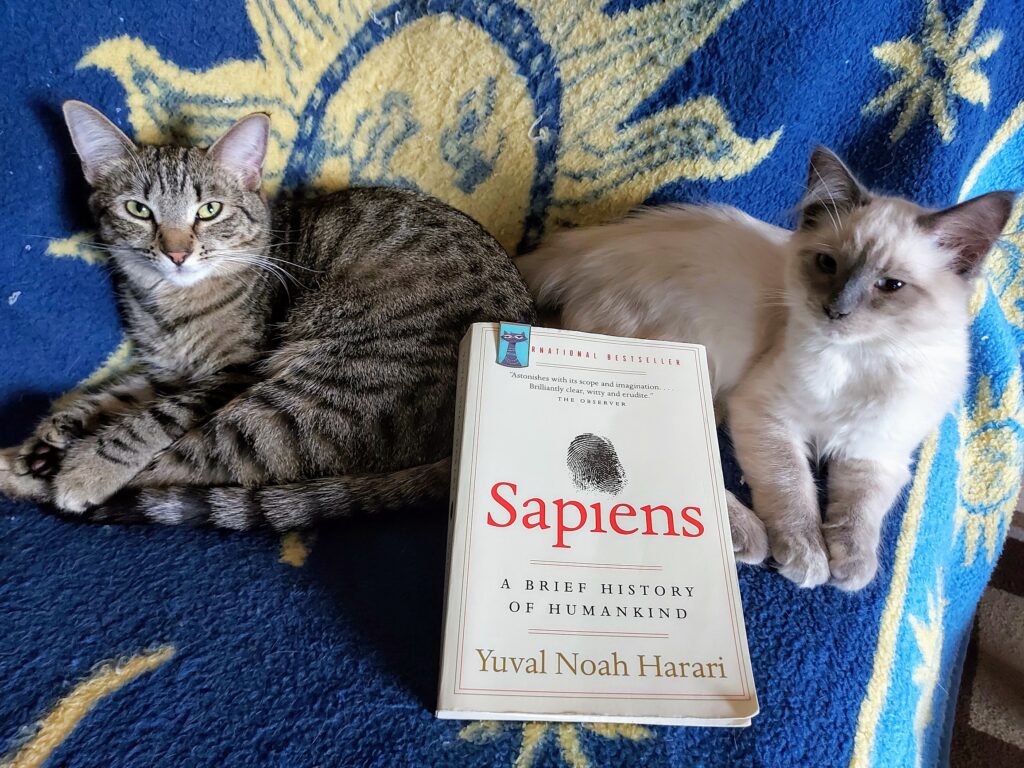Sapiens: A Brief History of Humankind by Yuval Noah Harari

I thought I would enjoy Sapiens, but I was not as engaged by it as I was by Humans: A Brief History of How We F***ed It All Up by Tom Phillips. You cannot blame Yuval Noah Harari for this because he does do a good job of telling a comprehensive, but also succinct history of humanity, and he does have an engaging narrative voice. But I found Sapiens to be a bit of a slog to get through, especially when it came to certain subjects like the evolution of mathematics, science and capitalism. What can I say, I am more of a humanities girl. My biggest take away from Sapiens, though, is that Sapiens should not have evolved, and that we have been destroying this planet we call home since pretty much the very beginning of our existence.
Harari takes us back in time to when there were multiple Homo species populating the Earth at the same time, including us Homo sapiens. No one really knows why the other Homo species died out while Sapiens evolved into what we are now; maybe it was genocide perpetrated by Sapiens, or maybe they were just absorbed into the Sapiens population through interbreeding. Sapiens started out in Africa like most other Homo species and as we spread around the world, we caused mass extinction events and made the planet increasing inhospitable for other animal species. Is it any wonder we are in the situation that we are in now regarding climate change?
An interesting thing that Harari points out, which I never really thought about before, is how every social construct is a “myth”. Religion, war, racism, sexism, homophobia, politics, capitalism, etc. – it was all thought up by Sapiens. As soon as we learned to think cognitively, we began inventing everything that dictates how human society functions. Biologically speaking, men are not superior to women and white skin is not superior to black or brown skin. Our bodies are designed to have sex with both the opposite sex and the same sex. I would like to hope that I live long enough to see some of these “myths” die out, but I am finding it increasingly harder to hold on to that hope.
A few other interesting things I learned from Sapiens:
- We were better off as hunters and gatherers. As soon as the agricultural revolution happened, we basically screwed ourselves over. Not only did it lead to disease and war, but it also gave rise to the aforementioned “myths”.
- How the bartering system evolved into the monetary system, and how “money is the most universal and most efficient system of mutual trust ever devised”. It is kind of wild when you really think about it. Why hasn’t this “mutual trust” extended beyond money? Maybe if we had more mutual trust there would be less hate in the world?
- Polytheism (belief in more than one god) is probably better than monotheism (belief in only one god), but really I just do not like any religion. Polytheists did not have problems with other religious beliefs, they just expected their own beliefs to be respected. Monotheism (i.e. Christianity, Islam), on the other hand, is all about forcing religion onto other people. Monotheists are responsible for the deaths of more people than polytheists ever were.
In all honesty, Sapiens kind of bummed me out. All it ended up doing is reinforcing my already dim view of Sapiens. I would not say that this book celebrates humanity. It is like a cautionary tale that exposes all our flaws in the hopes that we might learn something from it, but it was published in 2014, and we all know how badly things have gone since then. I feel like I am giving this book an undeserved bad rap. If you have a broader interest in history and do not have a pessimistic view of humanity like I do, then I think you might enjoy this book.